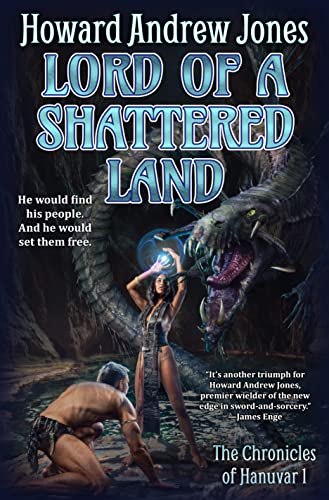 The fabled city of Volanus has fallen, pillaged by the Dervan Empire. Those of its people who were spared the sword have been scattered throughout Derva as slaves. Now, Volanus’s greatest general walks hidden through the Dervan Empire, searching for his lost people, that he might rescue them, one by one, so that Volanus may once more live again.
The fabled city of Volanus has fallen, pillaged by the Dervan Empire. Those of its people who were spared the sword have been scattered throughout Derva as slaves. Now, Volanus’s greatest general walks hidden through the Dervan Empire, searching for his lost people, that he might rescue them, one by one, so that Volanus may once more live again.
His name is Hanuvar.
And he will save them all.
Howard Andrew Jones’s Lord of a Shattered Land collects the first fourteen of Hanuvar’s adventures, presenting them as vignettes in the Hanuvid, a cycle of once historical records turned into plays by Hanuvar’s traveling companion, Antires Sosilos. The keen of mind and ear may already have detected the first resonances between Hanuvar and the famed Hannibal Barca, Volanus and Carthage, Derva and Rome. However, the resonances do not stop there. Lord of a Shattered Land is a hauntingly familiar book, holding up a mirror to the past and the present of the twin genres of heroic fantasy and sword and sorcery.
One can catch glimpses of Conan, Fafhrd and the Gray Mouser, Gotrek and Felix, and even the depravities of Hoptor the Vintner throughout the Dervan countryside. And Hanuvar grapples with the same inspirations and themes that have led to his indie contemporaries, such as Mortu and Kyrus, the Mongoose and Meerkat, the Rogues of Merth, and Jacob Pepper’s Known Lands.
Many literary critics would be tempted to reach for the deconstruction label.
Perhaps “love letter to the genre” is more appropriate.
Let’s start with Hanuvar, the famed general himself. Although not a barbarian as RPG enthusiasts would recognize, the general is an outsider to the Roman-influenced lands of the Dervan Empire, seeing clearly the advantages and the weaknesses of Dervan culture. He is a middle-aged man, the old man in a young man’s game, cunning, but with the strength to still stand in the line against younger men. He wears the accumulated regrets and doubts of experience without drowning beneath the cynicism and futility that claim many of his elder contemporaries in heroic fantasy. And Hanuvar possesses a moral core, a strength of purpose, that’s wielded with flexibility that never devolves into hypocrisy. The vantage point of age allows for complexity without compromise.
Hanuvar’s outsider status also makes a contrast to current trends. The 2010s saw a trend towards the Romanization of fantasy, with John Ringo, David Drake, Jim Butcher, Marc Alan Edelheit, and even scholar Adrian Goldsworthy contributing. Hanuvar’s not-quite-Carthaginian viewpoint allows the investigation of these Roman settings without the baggage that accompanies Rome when it serves as the protagonist faction. It is an investigation that is not blinded by Roman jingoism or the hatred from a defeated rival. Hanuvar can see the honor and nobility in Dervans as well as the decadence and treachery.
Much of the human conflict is centered not around questions of good and evil, but desire vs. desire. Again, that complexity comes without compromise, as humans are not the only forces affecting Hanuvar’s rescues. Outsiders from other realms are littered through the pages of the Hanuvid, and these things that should not be are always portrayed as seductive, corrupting, and murderous. The greatest depravities and the most poignant sacrifices appear in these clashes between Nature and Other. Sometimes Hanuvar conquers these foes like Solomon Kane, and other times he needs rescuing himself, like Northwest Smith. And Jones is able to portray the body horror that often accompanies these Others without reveling in excess.
The novelty of all these recast familiar elements would be for naught without the heavy doses of action needed for heroic fantasy. Not only does action reveal character, an almost forgotten insight in a world infatuated by endless pages of dialogue, the feats of strength, will, and endurance required to overcome Hanuvar’s challenges are satisfying and written with the same eye for effect as the previous complexities of character and setting. These varied feats would be not be out of place in The Argosy or even classic Weird Tales. Not only is Hanuvar a welcome addition to sword and sorcery, he is a welcome addition to the vast corpus of adventure literature.
Fans of both genres should seek out Lord of a Shattered Land.
Hanuvar will return in The City of Marble and Blood, in October 2023.
Thank you to Baen Books for providing an advanced reader copy.
That sounds amazing!
The best kind of review, it makes me want to read something awesome.